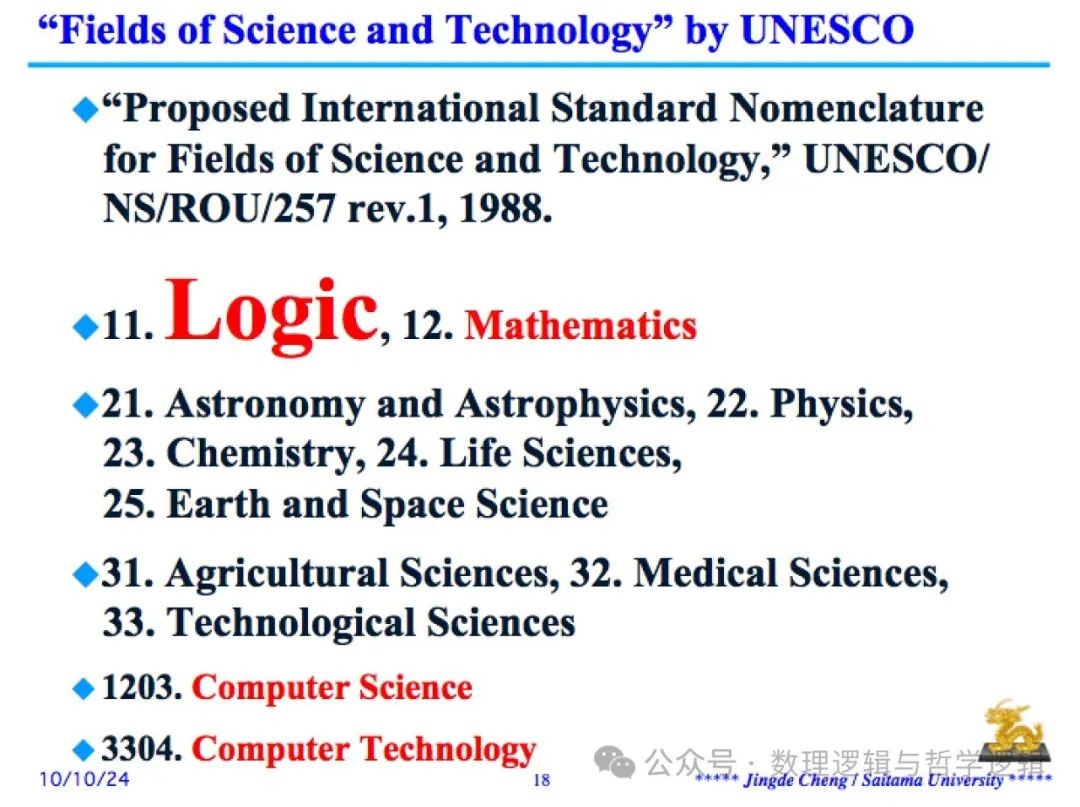博文
“逻辑”与“逻辑学”(2) -- 欧美名人的“逻辑/逻辑学”用例
||
[敬请读者注意] 本人保留本文的全部著作权利。如果哪位读者使用本文所描述内容,请务必如实引用并明白注明本文出处。如果本人发现任何人擅自使用本文任何部分内容而不明白注明出处,恕本人在网上广泛公布侵权者姓名。敬请各位读者注意,谢谢!
“逻辑”与“逻辑学”(2) -- 欧美名人的“逻辑/逻辑学”用例
程京德
在人类所有文化活动的语言文字交流当中,“逻辑(λογική/λόγος , logique, Logic, logik, 論理[ろんり])”是最频繁地被用到的词汇之一,同时也是最多义/歧义的词汇之一。那么,到底什么是“逻辑”?其涵义究竟为何?对于这个问题,随便问十个人就可能会得到十个不同的回答。另一方面,尽管希腊语及法、英、德语等中“逻辑”和“逻辑学”通常都是用一个词汇来表达,但是在日语和中文中,“逻辑”和“逻辑学”都可以是(但未必一定是)用两个词汇来清晰地区分表达的。所以,在理解世界各主要语言文字表达的时候,都有基于具体的上下文语境来区分清楚“逻辑”和“逻辑学”的需要。实际上,在人类所有文化活动的语言文字交流当中的绝大多数场合,“逻辑”一词并非指称“逻辑学”而是指称各种各样的具体场景,其中有些场景甚至很难说与“逻辑学”相关。本文试图澄清“逻辑”与“逻辑学”的诸多异同[1]。
欧美名人的“逻辑/逻辑学(logic)”用例
司各脱(John Duns Scotus, 1265-1308):“逻辑学是科学的科学,是技艺的技艺(Logic is the Science of Sciences and the Art of Arts)。”
[笔者论评]:司各脱所言之“logic”,谓之“科学”,那么当然是指称“逻辑学”。13世纪的“Science”之定义与今日不同,按照现代的科学之定义,“逻辑学”应该不属于“科学/Science”的范畴。从其在所有学问之中的重要地位来看,“逻辑学”本应像数学一样作为一门完全独立的基础学问/学科。但是,现在,通常把“逻辑学”视为哲学的一个分支,比如,在大学中,“逻辑学”作为一个专业, 往往划归于哲学系。
实际上,联合国教科文组织 UNESCO 于1988年发布的科学与技术分类表是将“逻辑学”列在数学之前作为第一大基础学科的:
培根(Francis Bacon, 1561-1626):“当前使用的逻辑学更多的是用于修正和稳定那些以普遍接受的概念为基础的错误,而不是帮助寻找真理。所以弊大于利。(The logic now in use serves rather to fix and give stability to the errors which have their foundation in commonly received notions than to help the search for truth. So it does more harm than good.)”
[笔者论评]:培根所言之“logic”,应该是指称“逻辑学”,因为是“逻辑学”提供识别判断错误的标准而非零散的“逻辑规律”。
莱布尼兹(Gottfried Wilhelm Leibniz, 1646-1716):“没有任何事情比依据真正的逻辑学进行形式推理的技艺更重要(Nothing can be more important than the art of formal reasoning according to true logic)。”
[笔者论评]:莱布尼兹所言之“logic”,当然是指称“逻辑学”,因为是“logic”提供了形式推理的正确性评价标准,并且,“true logic”应该就是莱布尼兹所想象的唯一合理的“逻辑学”。
庞加莱(Jules Henri Poincaré, 1854-1912):“我们通过逻辑学来证明,通过直觉来发现 (C'est par la logique qu'on démontre, c'est par l'intuition qu'on invente)(It is by logic that we prove, but by intuition that we discover)。”
[笔者论评]:庞加莱所言之“logic”,应该是“逻辑学”,因为是数理逻辑学为数学正确性证明提供了坚实的逻辑基础,尽管在庞加莱的年代,现代数理逻辑还未完全建立起来。
庞加莱(Jules Henri Poincaré, 1854-1912):“逻辑学告诉我们,在这条或那条路上,我们一定不会遇到任何障碍;它没有告诉我们哪一条路将通向目标终点。为此,我们必须从远处看到目标,而教会我们看到的能力就是直觉。没有它,几何学家就像一个精通语法但缺乏思想的作家。(La logique nous apprend que sur tel ou tel chemin nous sommes sûrs de ne pas rencontrer d'obstacle ; elle ne nous dit pas quel est celui qui mène au but. Pour cela il faut voir le but de loin, et la faculté qui nous apprend à voir, c'est l'intuition. Sans elle, le géomètre serait comme un écrivain qui serait ferré sur la grammaire, mais qui n'aurait pas d'idées.) (Logic teaches us that on such and such a road we are sure of not meeting an obstacle; it does not tell us which is the road that leads to the desired end. For this, it is necessary to see the end from afar, and the faculty which teaches us to see is intuition. Without it, the geometrician would be like a writer well up in grammar but destitute of ideas.)”
[笔者论评]:庞加莱所言之“logic”,似乎应该是“逻辑学”而非具体的“逻辑分析/推理”,从他形容没有直觉的几何学家就像一个精通语法但缺乏思想的作家来看的话。
罗素(Bertrand Arthur William Russell, 1872-1970):“所有数学都是符号逻辑学这一事实是我们这个时代最伟大的发现之一;当这个事实被确立后,数学原理的其余部分就存在于符号逻辑学本身的分析之中(The fact that all Mathematics is Symbolic Logic is one of the greatest discoveries of our age; and when this fact has been established, the remainder of the principles of mathematics consists in the analysis of Symbolic Logic itself)。”[2]
[笔者论评]:罗素所言之“logic”,当然是指称“逻辑学”。上面这段名言是罗素主张数学哲学/数学基础之“逻辑主义”,亦即,全部数学可以归结为逻辑学,的经典论断。
罗素(Bertrand Arthur William Russell, 1872-1970):“逻辑学的规则之于数学,犹如结构的规则之于建筑(The rules of logic are to mathematics what those of structure are to architecture)。”- “The Study of Mathematics”(1907)
[笔者论评]:罗素所言之“logic”,当然是指称“逻辑学”,罗素强调“逻辑学”对所有数学的不可或缺。无论所有数学能否最终归结为“逻辑学”,“逻辑学”对所有数学的不可或缺性应该是毋庸置疑的。
罗素(Bertrand Arthur William Russell, 1872-1970):“逻辑学的真正功能... 应用于经验问题... 是分析性的而非建设性的(The true function of logic ... as applied to matters of experience ... is analytic rather than constructive)。”– “Our Knowledge of the External World”(1914)
[笔者论评]:罗素所言之“logic”,是指称“逻辑学”,罗素强调“逻辑学”的分析性本质。
罗素(Bertrand Arthur William Russell, 1872-1970):“所有传统逻辑学习惯性地假设精确的符号被使用。因此,它不适用于这个地球上的生命,而只适用于一个想象的天体存在 ... 与其他研究相比,逻辑学让我们更接近天堂。(All traditional logic habitually assumes that precise symbols are being employed. It is therefore not applicable to this terrestial life but only to an imagined celestial existence ... logic takes us nearer to heaven than other studies.)” – “Vagueness”(1923)
[笔者论评]:罗素所言之“logic”,是指称“逻辑学”,强调现代“逻辑学”之符号化形式化,而暗讽人类在语言符号化形式化方面的缺陷:模糊性。
爱因斯坦(Albert Einstein, 1879-1955):“逻辑将会带你从 A 到 B,想象力将会带你到任何地方(Logic will get you from A to B. Imagination will take you everywhere)。”
[笔者论评]:爱因斯坦所言之“logic”,应该是指称“逻辑分析/推理”;爱因斯坦似乎想指出“逻辑分析/推理”的局限性:只能帮助我们到达有明确规划路径的地方,而更强调想象力的无限可能性:到达任何能够想象到的地方。但是,爱因斯坦此言未必完全正确。考虑科学研究探索过程,因为任何科学新发现都不是可以准确预期的,没有清晰目标的,所以,如果不是完全的偶然,那么能够指引探索方向的唯一根据,就是与领域无关的、一般有效的“逻辑分析/推理”正确性准则。另一方面,合理的想象力不会没有任何基础出发点,基于背景知识前提的想象,本身应该有隐含着“逻辑分析/推理”。想象力无论多么丰富,毫无根据的“胡思乱想”应该得不到什么有益的结果。
爱因斯坦(Albert Einstein, 1879-1955):“西方科学的发展基于两大成就,一是希腊哲学家发明的(在欧几里得几何学中的)形式逻辑系统,二是(在文艺复兴时期)发现了通过系统的实验找出因果关系的可能性 (The development of Western Science has been based on two great achievements, the invention of the formal logical system (in Euclidean geometry) by the Greek philosophers, and the discovery of the possibility of finding out causal relationships by systematic experiment (at the Renaissance))。”
[笔者论评]:爱因斯坦所言之“formal logical system”,当然是指称“逻辑学”(否则无从言及“形式逻辑系统”),虽然被爱因斯坦举例为“形式逻辑系统”的欧几里得几何学远非是在现代意义上的形式化。
维特根斯坦(Ludwig Josef Johann Wittgenstein, 1889-1951):“逻辑学在什么意义上是崇高的?是因为逻辑学似乎有一种特殊的深度 -- 一种普遍的意义。逻辑学似乎位于所有科学的根基。 -- 因为逻辑学调查探究的是所有事物的本质。它寻求洞察事物的根基,而并非让自己去关心实际发生的是这个还是那个。它的兴起,不是出于对自然事实的兴趣,也不是出于把握因果关系的需要:而是出于试图理解一切经验事物的基础或本质的迫切需要。然而,并非为此我们必须寻找新的事实;而是相反,我们调查的本质是我们并不寻求从中学习任何新的东西。我们想要理解的是已经展现在我们面前的东西。因为这似乎才是我们在某种意义上未理解的(In what sense is logic something sublime? For there seemed to pertain to logic a peculiar depth -- a universal significance. Logic lay, it seemed, at the bottom of all the sciences. -- For logical investigation explores the nature of all things. It seeks to see to the bottom of things and is not meant to concern itself whether what actually happens is this or that. It takes its rise, not from an interest in the facts of nature, nor from a need to grasp causal connexions: but from an urge to understand the basis, or essence, of everything empirical. Not, however, as if to this end we had to hunt out new facts; it is, rather, of the essence of our investigation that we do not seek to learn anything new by it. We want to understand something that is already in plain view. For this is what we seem in some sense not to understand.)”[3]
[笔者论评]:上面这段关于“逻辑学”的名言出自于反映维特根斯坦后期哲学思想的《哲学研究》[3](编辑出版于维特根斯坦去世之后),应该说是准确地陈述了维特根斯坦最终(相对于其前期)对于“逻辑学”的认识/定义。
维特根斯坦(Ludwig Josef Johann Wittgenstein, 1889-1951):“拉姆赛曾在与我的交谈中强调,逻辑学是一门‘规范科学’。我不知道他到底在想什么,但毫无疑问,这与我后来才明白的事情密切相关;即,在哲学中,我们经常将词语的使用与有固定规则的游戏和演算相比较,但不能说使用语言的人一定在玩这样的游戏。(F. P. Ramsey once emphasized in conversation with me that logic was a ‘normative science’. I do not know exactly what he had in mind, but it was doubtless closely related to what only dawned on me later: namely, that in philosophy we often compare the use of words with games and calculi which have fixed rules, but cannot say that someone who is using language must be playing such a game.)。”[3]
[笔者论评]:拉姆塞对“逻辑学”是“规范科学”的界定,是非常准确的,“逻辑学”就是研究并提供论证推理的逻辑有效性标准的。
维特根斯坦(Ludwig Josef Johann Wittgenstein, 1889-1951):“我们想说,逻辑学中不能有任何模糊(We want to say that there can't be any vagueness in logic)。”[3]
维特根斯坦(Ludwig Josef Johann Wittgenstein, 1889-1951):“逻辑学所处理的命题和词语应该是纯粹而清晰的(The proposition and the word that logic deals with are supposed to be something pure and clear-cut)。”[3]
[笔者论评]:上面两段中,维特根斯坦所言之“logic”,应该是指称“逻辑学”,都强调了“逻辑学”的本质特征之一:清晰准确表达。
下面所举维特根斯坦的用例全部出自于其早期名著《逻辑哲学论》[4]。“逻辑”在维特根斯坦的早期哲学思想中占有非常关键的核心地位。
维特根斯坦(Ludwig Josef Johann Wittgenstein, 1889-1951):“我的语言的界限意味着我的世界的界限。逻辑充斥着世界;世界的界限也是它的极限。因此,我们不能在逻辑上说:世界上有这有那,却没有那个。(The limits of my language mean the limits of my world. Logic fills the world: the limits of the world are also its limits. We cannot therefore say in logic: This and this there is in the world, that there is not.)”[4]
[笔者论评]:在维特根斯坦的早期哲学思想中,维特根斯坦所言之“逻辑(logic)”,是世界的最基本核心要素,是比作为学问的“逻辑学”更深层次和更基础的。维特根斯坦认为,“逻辑”是语言和世界的基础,其界限决定了语言和世界的界限,也是哲学所能够讨论的一切问题的界限。“逻辑”是世界的“形式”,是自明的,是绝对的不可置疑的。这些思想贯穿于其《逻辑哲学论》。
维特根斯坦(Ludwig Josef Johann Wittgenstein, 1889-1951):“人类不可能立即从中得出语言的逻辑是什么。语言掩盖了思想。(It is not humanly possible to gather immediately from it what the logic of language is. Language disguises thought.)”[4]
维特根斯坦(Ludwig Josef Johann Wittgenstein, 1889-1951):“因此,我们不能在逻辑上说:世界上有这有那,没有那(We cannot therefore say in logic: This and this there is in the world, that there is not)。”[4]
维特根斯坦(Ludwig Josef Johann Wittgenstein, 1889-1951):“自明性,罗素多次言及了它,只有通过语言本身防止每个逻辑错误,才能在逻辑中被抛弃。逻辑是先验的,在于我们不能不符合逻辑地思考(Self-evidence, of which Russell has said so much, can only be discarded in logic by language itself preventing every logical mistake. That logic is a priori consists in the fact that we cannot think illogically)”[4]
维特根斯坦(Ludwig Josef Johann Wittgenstein, 1889-1951):“逻辑研究意味着对所有规律性的研究。而外界的逻辑都是偶然。(Logical research means the investigation of all regularity. And outside logic all is accident.)”[4]
维特根斯坦(Ludwig Josef Johann Wittgenstein, 1889-1951):“哲学家的大多数问题和命题都源于这样一个事实,即我们不理解我们语言的逻辑(Most questions and propositions of the philosophers result from the fact that we do not understand the logic of our language)”[4]
维特根斯坦(Ludwig Josef Johann Wittgenstein, 1889-1951):“对逻辑的探索意味着对一切服从规律的事物的探索。在逻辑之外,一切都是偶然的。(The exploration of logic means the exploration of everything that is subject to law. And outside logic everything is accidental.)”[4]
维特根斯坦(Ludwig Josef Johann Wittgenstein, 1889-1951):“逻辑先于每一次经验 -- 事情就是如此(Logic precedes every experience -- that something is so)。”[4]
维特根斯坦(Ludwig Josef Johann Wittgenstein, 1889-1951):“逻辑命题以重言式所展示的世界逻辑,数学是以方程式展示的(The logic of the world which the propositions of logic show in tautologies, mathematics shows in equations)。”[4]
维特根斯坦(Ludwig Josef Johann Wittgenstein, 1889-1951):“数学是一种逻辑方法(Mathematics is a method of logic)。”[4]
[笔者论评]:在上述《逻辑哲学轮》中的这些段落中,维特根斯坦所言之“logic”,都是他所认为的“逻辑”而非“逻辑学”。
塔斯基(Alfred Tarski, 1901-1983):“有一门特殊的学问叫做逻辑学,它被认为是所有其他科学的基础(There is a special discipline, called logic, which is considered to be the basis for all other sciences)。”
[笔者论评]:塔斯基所言之“logic”,当然是“逻辑学”,塔斯基的话说的再清楚不过了。
哥德尔(Kurt Friedrich Gödel, 1906-1978):“数理逻辑,它是一门先于所有其他科学的科学,包含了支撑所有科学的思想和原理(Mathematical Logic, it is a science prior to all others, which contains the ideas and principles underlying all sciences)。”
[笔者论评]:哥德尔所言之“Mathematical Logic”,是以他本人的工作(经典数理逻辑一阶谓词演算的完全性)为标志完全建立起来的。
塔斯基和哥德尔对“逻辑学”的基础地位的肯定/断定,貌似在重复司各脱的话,但是,在20世纪,这些肯定/断定要比司各脱时代的13世纪时根据充分得多了。看看从数理逻辑孕育出来的计算理论为现代电子数字计算机提供的理论基础,看看今天各行各业对计算机系统的依赖程度,难道还能有任何理由可以无视“逻辑学”的基础地位吗?
参考文献
[1] 程京德,“‘逻辑’与‘逻辑学’(1) -- 起源、定义、异同”,微信公众号“数理逻辑与哲学逻辑”,科学网博客,2024年10月12日。
[2] B. Russell, “The Principles of Mathematics, with an introduction to the second edition,” Cambridge: at the University Press, 1903, W.W.Norton & Company, 1938 (2nd Edition).
[3] L. J. J. Wittgenstein, G. E. M. Anscombe and R. Rhees (eds.), “Philosophical Investigations,” translated by G. E. M. Anscombe, Basil Blackwell, 1953, 1958, 1967; 中译:李步楼 译,《哲学研究》,1996年; L. J. J. Wittgenstein, “Philosophische Untersuchungen,” 中译:陈嘉映 译,《哲学研究》,2005年; L. J. J. Wittgenstein, P. M. S. Hacker and J. Schulte (eds.), “Philosophische Untersuchungen / Philosophical Investigations,” The German text, with an English translated by G. E. M. Anscombe, P. M. S. Hacker, and J. Schulte, Revised fourth edition, Weiey-Blackwell, 1953, 1958, 2001, 2009.
[4] L. J. J. Wittgenstein, “Logisch-Philosophische Abhandlung,” Annalen der Naturphilosophie, 1921; 中译:郭英 译,《逻辑哲学论》,1962-1985年; “Tractatus Logico-Philosophicus,” translated by D. F. Pears & B. F. McGuinness, Routledge&Kegan Paul Ltd., 1961-1974; 中译:贺绍甲 译,《逻辑哲学论》,2009年。
微信公众号“数理逻辑与哲学逻辑”
https://blog.sciencenet.cn/blog-2371919-1456651.html
上一篇:“逻辑”与“逻辑学” (1) -- 起源、定义、异同
下一篇:“哥德尔不完全性定理”误解误用实例分析(4) - 所谓“数学公理化”的谬误

